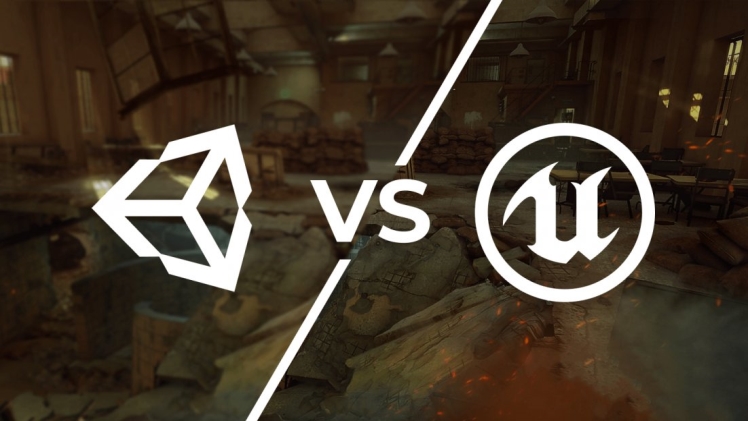When it comes to game development, the two most popular engines are Unity and Unreal. But which is better? This can be difficult to answer as there is no clear-cut winner. Both engines have their advantages and disadvantages, making it important for developers to weigh the pros and cons before deciding between them.
In this article, we will compare both engines, so you can decide which engine is best for your project. So without further ado, let’s dive into our comparison of Unity vs. Unreal!
An Overview of Unity
Unity is a powerful game engine developers use to create immersive and interactive gaming experiences. Unity enables users to easily develop 3D, 2D, virtual reality (VR), and augmented reality (AR) games. It offers extensive tools and features for creating visually stunning graphics and realistic environments.
Unity’s graphical user interface (GUI) provides an intuitive workflow that allows users to customize their games without having any prior coding experience. Moreover, an unreal engine game development company can also take advantage of Unity’s asset store, which provides users with a library of free and paid assets that can be used to create custom gaming experiences.
Pros & Cons of Unity
In terms of pros, Unity provides excellent graphics rendering capabilities and physics engines, which help create incredibly realistic gaming worlds. It also has robust tools for developing user interfaces, networking, debugging, and more. Plenty of learning resources are available online for beginners just getting started with Unity – from tutorials to forums full of helpful tips! Finally, due to its popularity among developers, tons of support is available in plugins, assets, and more.
On the downside, the scripting system in Unity can be a bit restrictive for some developers – specifically those who are used to working with other engines. Additionally, due to its user-friendly nature, there is a lack of flexibility compared to more advanced game creation tools like Unreal Engine. Furthermore, Unity does not offer as many features as Unreal when creating complex games. Finally, Unity’s asset store selection isn’t quite as extensive as Unreal’s.
An Overview of Unreal Engine
Unreal Engine is a powerful and versatile game engine for creating 3D and 2D games. It was developed by Epic Games in 1998 and has become the most famous engine among developers today. Unreal Engine provides developers with extensive tools to create amazing visuals, immersive gameplay, realistic physics, and more. In addition, Unreal Engine allows developers to quickly develop prototypes or iterate on existing designs without costly reworks.
Uncompromisingly intuitive and equipped with a range of practical features, Unreal Engine grants developers the capability to turn their visions into reality in no time. Unity3D game development services and Unreal Engine are the leading game engines today. Both have been around for some time, but deciding which is better is difficult.
Pros & Cons of Unreal Engine
Unreal Engine offers developers a wide range of powerful tools, making it an attractive choice for many game developers. It is well known for its detailed textures, lighting effects, and realistic physics that can bring games to life. Some major advantages to using Unreal Engine over other engines, such as its support for Visual Scripting and Blueprint systems, which allow users to quickly prototype their ideas without writing code. Furthermore, UE4 has a large community of users who share knowledge and resources.
While there are many benefits to using the Unreal Engine, some drawbacks should be considered before committing to it as your engine of choice. Firstly, the engine requires a lot of technical knowledge to get the most out of it – this means that developers new to UE4 may take longer to become proficient in the engine than with other engines.
Additionally, Unreal Engine is not free and requires a subscription fee which can be pricey for aspiring game developers. Finally, UE4 has some performance issues on mobile platforms that need to be considered when developing games for them.
Comparison Criteria Between Unity vs. Unreal
Here are the main criteria to consider when deciding between Unity vs. Unreal:
- Cost – Unity comes with a free version, while Unreal requires you to purchase a license. This can be an important factor for people just starting out or on a budget.
- Platforms Supported– Unity supports most major platforms, such as Windows, MacOS, iOS, Android, and Xbox One, whereas Unreal mainly focuses on PC and console gaming. Unity may be the better choice if your project involves mobile development.
- Graphics Quality – Both engines’ graphical capabilities can produce high-quality visuals. However, Unreal has a clear edge here due to its more advanced lighting system and real-time ray tracing capabilities. However, if your project doesn’t require these features, Unity may still be the better choice.
- Ease of Use –Unity is often considered the more beginner-friendly engine, while Unreal is geared towards experienced game developers. This can also depend on your familiarity with coding languages, as Unreal leans heavily towards C++ while Unity supports multiple languages like JavaScript and C++.
- Development Speed –Unity’s development speed tends to be faster than Unreal’s due to its simpler workflow, but this can vary depending on the project and the developer’s experience level theviralnewj.
Choosing between Unity vs. Unreal comes down to personal preference and your particular needs for a project. It’s important to research and consider the criteria listed above before deciding. Whatever engine you choose, both can create great games and experiences.
The Bottom Line
When choosing a game engine, the decision depends on the type of project that you’re working on and your individual preferences. Both Unity and Unreal are excellent engines with their strengths and weaknesses. In general, Unity is easier to learn, more user-friendly, and great for smaller projects, while Unreal offers more detailed visuals and better scalability for larger projects.
Ultimately, both engines offer amazing possibilities in terms of developing games. So take some time to look into each before making your final decision!

